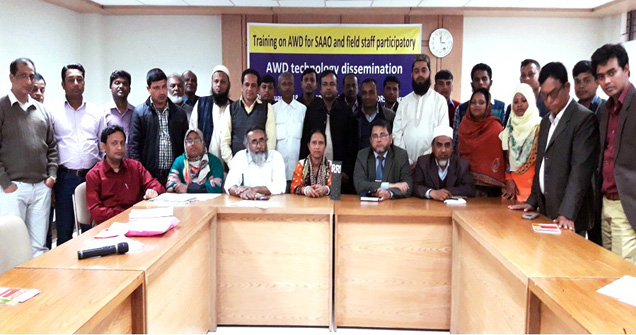RANGPUR, Feb 21, 2018 (BSS)-Experts at a training course have said adoption of the Alternate Drying and Wetting (AWD) irrigation technology while farming Boro rice could save up to 30 percent irrigation water and increase 15 percent rice production at reduced costs.
The Northwest Focal Area Network under financial assistance of the International Rice Research Institute (IRRI) organised the course styled ‘Participatory AWD Technology Dissemination’ at RDRS auditorium here on Tuesday, a press release said today.
Sixteen sub-assistant agriculture officers and 12 field level staff of the Department of Agriculture Extension (DAE) from six northern districts of Thakurgaon, Nilphamari, Rangpur, Gaibandha, Lalmonirhat and Kurigram districts took part in the course.
Principal scientific officer of Bangladesh Rice Research Institute (BRRI) here Agriculturist Dr Md Abu Bakar Siddique Sarker conducted the training course as the main resource person.
Rangpur Regional Betar Farm Broadcasting Officer of Agriculture Information Service Agriculturist Md Abu Sayem and Senior Coordinator (Agriculture and Environment) of RDRS Bangladesh Agriculturist Md Mamunur Rashid were present as assistant trainers.
Deputy director of the DAE Agriculturist Dr Md Sarwarul Haque inaugurated the training course as the chief guest with IRRI consultant at its Dhaka Office Agriculturist Dr Ahmad Salahuddin in the chair.
Agriculturist Mamunur Rashid said 360 farmers are adopting the AWD irrigation method in cultivating Boro rice this season on their 384 acres of land in six northern districts with Northwest Focal Area Network assistance under supervision of five NGOs and nine farmers’ federations.
“Adoption of the technology could reduce 5 numbers of irrigation, save up to 30 percent underground water, 30 litres diesel and electricity for irrigation in addition to producing 500 kg more Boro rice per hectare,” Rashid added.
Agriculturist Abu Sayem said the farmers generally use 3,000 to 4,000 litres irrigated underground waters to produce one kg Boro rice, whereas it needs only 1,500 to 2,000 litres when the AWD used.
“Due to climate change, the agriculture sector faces severe threat,” he said and favoured for crop zoning to cultivate more irrigation water consuming crop in the southern zones and less water consuming crop in the drought-prone northern zones.
The chief guest suggested the participants to popularise the AWD technology among the farmers in farming Boro rice to produce additional crop at lower costs and ensure food security saving huge underground water and improving environment and ecology.



